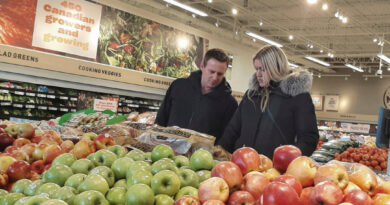Australia Successfully Dodges Major Impact of ‘Liberation Day’ Tariffs, While Trump Criticizes Beef Restrictions
Trump’s ‘Liberation Day’ announcement will result in tariffs being applied to approximately 75 countries globally.
Australia has been relatively lucky following the introduction of the Trump administration’s “Liberation Day” global tariffs.
Referred to as “Liberation Day,” the announcement on April 2 disclosed a minimum 10 percent baseline tariff on goods from about 75 countries entering the United States—some countries will face even higher rates.
President Donald Trump specifically targeted Aussie beef exports to the United States, citing concerns about local biosecurity restrictions hindering U.S. companies seeking to enter the Australian market.
Australia restricts imports of U.S. beef, pork, cooked poultry, and pears due to various disease-related worries.
Since 2003, Australia has banned U.S. beef imports over concerns about bovine spongiform encephalopathy, also known as mad cow disease.
While Australia does not impose a direct tariff on U.S. goods, the Trump administration took Australia’s biosecurity fees into consideration.
“Australians … they’re wonderful people, wonderful everything, but they ban American beef,” said Trump during a press briefing on March 2.
![WASHINGTON, DC - APRIL 02: U.S. President Donald Trump holds up a copy of a 2025 National Trade Estima...
</figure>
</p></div>
<p>“Yet we imported US$3 billion of Australian beef from them just last year alone.</p>
<p>“They won’t take any of our beef, they don’t want it because they don’t want it to affect their farmers and, you know, I don’t blame them but (we’re) doing the same thing right now starting at midnight tonight, I would say.”</p>
<p>The United States is Australia’s largest red meat marketing accounting for almost 400,000 tonnes.</p>
<h2>Labor Government to Help Exporters Find New Markets</h2>
<p>Australian Prime Minister Anthony Albanese held an immediate press conference in response to the tariffs, stating that they contradicted the relationship between the two nations.</p>
<p>“President Trump referred to reciprocal tariffs—a reciprocal tariff would be zero, not 10 percent,” he argued.</p>
<p>“The administration’s tariffs have no basis in logic and they go against the basis of our two nations’ partnership.</p>
<p>“This is not the act of a friend.”</p>
<p>Albanese expressed concerns about the tariffs adding to global economic uncertainty and increasing costs in the United States.</p>
<p>“Our existing Free Trade Agreement with the United States contains dispute resolution mechanisms,” Albanese noted.</p>
<p>“We want to resolve this issue without resorting to using these, as we do support continued constructive engagement with our friends in the U.S.”</p>
<p>The prime minister also announced a $50 million fund to assist agricultural exporters in finding new markets.</p>
<p>“We will establish a new economic resilience program through our National Reconstruction Fund. This will provide $1 billion in zero-interest loans for firms to capitalize on new export opportunities,” said Albanese.</p>
<p>“Just as we are already encouraging more people to buy Australian, our Labor government will buy Australian, too.”</p>
<p>The prime minister also mentioned a “critical minerals strategic reserve,” promising further details to be disclosed later.</p>
<p>Meanwhile, Trade Minister Don Farrell expressed hope for a free trade deal with the European Union.</p>
<p>“The world has changed. As of today, the world has changed for Europe.</p>
<p>“Europe has now [been] set back to a much higher tariff into the United States. If they’re sensible, if they’re sensible, they will make us a better offer on the issues that made the agreement fall over last time, and we will get a free trade agreement with the with the EU, the largest economy in the world,” he informed reporters.</p>
<p>The opposition continued to question Labor’s negotiation skills.</p>
<p>“We need to have a capacity to stand up and to negotiate and to arrive at the best possible outcome for our country. And that’s, I think, in part, what this election is about,” said Opposition Leader Peter Dutton on 2GB radio.</p>
<h2>The Lower End of the Tariffs</h2>
<p>Australia will face a 10 percent baseline tariff, which is on the lower end of the “Liberation Day” tariffs.</p>
<p>Several Asian nations will bear the brunt of higher tariffs imposed by the administration including Cambodia at 97—49 percent tariffs, Vietnam 90—46, Sri Lanka 88—44, Bangladesh 74—34, Thailand 72—36, China 67—34, Indonesia 64—32, and Taiwan 64—32.</p>
<p>Trump highlighted the significant differences in tariffs imposed on motorcycle imports, with the United States charging 2.4 percent while Thailand and others charge much higher rates like 60 percent, India at 70 percent, and Vietnam at 75 percent, among others.</p>
<p>He also reiterated the challenges faced by U.S. motor exports due to considerably high tariffs from the European Union, India, South Korea, and Japan.</p>
<p>The 10 percent baseline is lower compared to the 25 percent tariff imposed on Australian steel and aluminum exports.</p>
<p>CEO of the Australian Meat Industry Council, Tim Ryan, expressed confidence in Australia’s ability to withstand the impact of the tariffs owing to the strong demand for Australian beef.</p>
</div>
<p><br />
<br /><a href=](https://www.theepochtimes.com/_next/image?url=https%3A%2F%2Fimg.theepochtimes.com%2Fassets%2Fuploads%2F2025%2F04%2F02%2Fid5835890-GettyImages-2208184525.jpg&w=1200&q=75) Source link
Source link
- Report: Trump Administration Urges Europe to Purchase U.S. Arms
- Rep. Booker Once Called Filibusters an ‘Abuse of Power’ Before Breaking Senate Speech Record – One America News Network





